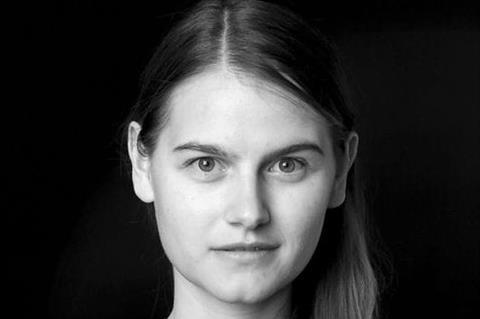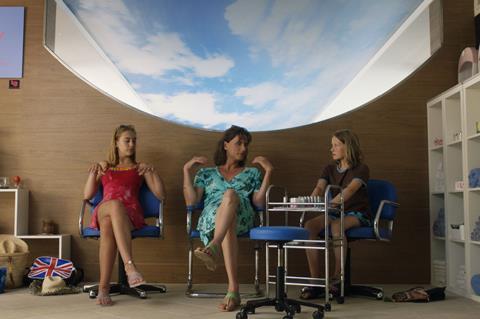
A Perfectly Normal Family, the feature debut of Danish writer–director Malou Reymann, is screening in both the Big Screen competition at International Film Festival Rotterdam (IFFR) and the Nordic competition in Goteborg.
The film is about two young sisters whose lives are disrupted when their father announces he is transitioning to become a woman. The subject matter is very close to home for Reymann, who grew up with a father who became a woman.
Reymann, who has also acted, studied at the UK’s NFTS and has previously directed shorts including 13, Interruption and Return.
New Europe is handing sales on A Perfectly Normal Family, which has already sold to Haut et Court for France. The film, set to launch in Denmark on February 20, is produced by Matilda Appelin and René Ezra for Nordisk Film with support from the Danish Film Institute.
This story means a lot to you and your family; did you ever think that maybe it was too much to tackle with your first feature?
I had a feeling I would work on this film at some point in my life but not as the first one. But after film school [at the NFTS] I was trying to work on another feature and I couldn’t really connect to it. We didn’t get funding in the end, and that felt right, because I wasn’t working on the right project. I told the commissioner about this, and he said, THAT is the film I want to fund. I thought ,I need to do it, even though it feels super scary. That was a great decision.
We’ve seen lots of stories about the journey trans people go on, why did you want to concentrate on the perspective of the children?
I felt like I had a special position to tell the story from, that perspective of the daughter enables it to be a story about a family that undergoes a change, rather than only being about a transition.
Those transition stories are also important, of course, but this was a different perspective that enabled me to make a film that could be more ordinary. Maybe it can embrace an audience who sees themselves as part of the norm. Maybe they can identify themselves with something they didn’t think they could identify themselves with. It’s not that I didn’t want to reach an LGBT audience also, I hope they also want to watch the film, but if I can get 50-year-old straight men to watch it and understand it… I want to make that gap [of understanding] smaller.
Did you talk to other families who had gone through a similar situation?
I didn’t talk to other families but I talked to my dad a lot while making the film. There were a lot of things she couldn’t remember herself, because she was going through a big life crisis, but she gave me her diaries from the time to read instead. I read her diaries written during the two years of this transition. That was amazing to get her perspective. That was so beautiful.
How did you cast the pivotal role of the young child Emma?
We did hundreds of castings. Kaya Toft Loholt, who plays Emma, was in the first round and she was just incredible. She was 10 when we shot the film, but she understood things at an extraordinary level. After the shoot, Mikkel [Boe Følsgaard] said she is the best actor he’s ever worked with!

Why was Mikkel Boe Følsgaard right for the role of Thomas/Agnete? Did you ever consider casting a transgender person in the role?
My thought was that we would have to make a transition – because it was important to me to show the father as a man in the beginning because I wanted to present an ordinary family that people could relate to as being normal. That’s why we needed to make a transition either way. I spoke to my dad about it also, it would be so complicated for a transgender woman who has already undergone that whole journey to become her true self, to then go back and play a man. I really don’t think it would be possible, just the whole physicality of it. Moving and sitting and talking as a man, I think it wouldn’t be possible.
Obviously it’s so complicated. I understand the criticism [for not casting a trans actor or actress] but I have to hold onto the principle that everyone should be able to play anyone. Hopefully at some point we’ll come to a place where transgender people can portray cis people, I hope it will become more accepted to be trans so that we come to a different place. We are still in a difficult time with these issues.
What do you think of Mikkel’s performance?
I watched the film with my dad it was very emotional, we laughed and cried. The first thing she said was, ‘Wow, I can’t believe Mikkel can play this role to that level of authenticity.’ What’s amazing with Mikkel is he has an ability to be ordinary and very extraordinary at the same time. There’s something he’s also extremely generous as an actor, what he needed to go through was very physically challenging for him, wearing the prosthetics for example, and he never questioned it, or said this is too far, he really just went in all the way.
It was so important for him to understand the complexity of it and portray it really truthfully.
What do you want the audience to experience?
I wanted to make a film that can make people laugh and cry, I think that enables you to let go. There can be fear around the subject of saying the wrong thing, of not being able to laugh. There is something about that fear that is dangerous. I wanted people to be able to talk about the subject without being afraid. If me and my dad can laugh about it, hopefully other people can laugh about it. There is a big difference between laughing and mocking.
How do you think it represents the kinds of films you want to make?
I’m very interested in the ‘other’, being different from the norm in any kind of context. That can also be about being a woman, our world is still defined by masculinity. The next film I am writing is about female sexuality in the 1930s. I’m interested in the gap between the norm and the other, films that somehow lessen that gap or make the other seem more understandable.

























No comments yet